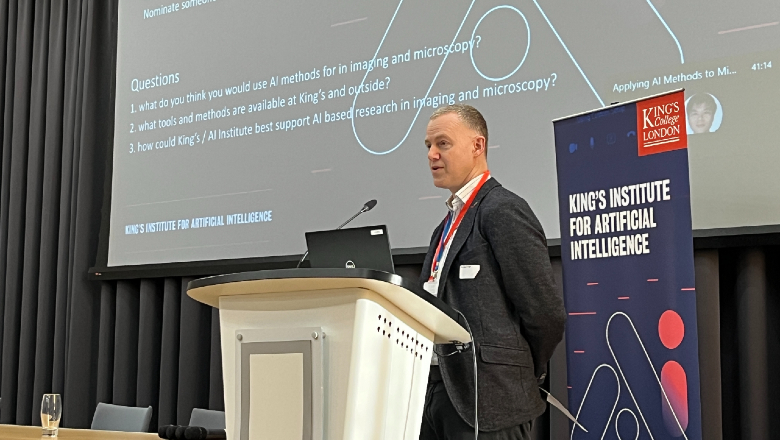
Professor Andrew King
Professor in Medical Image Analysis
Biography
Professor King received a BSc. (Hons) degree in Computer Science from Manchester University in 1989, an MSc. (with distinction) in Cognition, Computing and Psychology from Warwick University in 1992, and a PhD degree in Computer Science from Warwick University in 1997. From 2001-2005 he worked as an Assistant Professor in the Computer Science department at Mekelle University in Northern Ethiopia. Since 2006 he has worked in the School of Biomedical Engineering & Imaging Sciences at King's, focusing on machine learning and medical image analysis.
Professor King leads the Motion Modelling and Analysis group which performs a range of research into the use of Artificial Intelligence for medical imaging. He is a founder and current organising committee member of the FAIMI (Fairness of AI for Medical Imaging) academic initiative.
Research Interests:
Artificial Intelligence, Medical Image Analysis, Fairness
Research

Centre for Doctoral Training in Digital Twins for Healthcare
DT4Health brings together a world-class multidisciplinary team of supervisors to train future innovation leaders to articulate and materialise the Digital Twin vision in healthcare.
News
New AI-powered app aims to improve tropical skin disease detection
SkincAIr brings together African and European partners to fight skin-related Neglected Tropical Diseases (NTDs) in Sub-Saharan Africa, through an AI-powered...

New study investigates racial bias in AI used for heart imaging
Researchers from the School have completed a study examining the source of racial bias in artificial intelligence (AI) models used for analysing heart scans.

New artificial intelligence tool automates analysis of large-scale cardiac scan databases
King’s researchers have proposed and validated the first start-to-end pipeline for fully automated analysis of large, unstructured clinical and research...

New open-source AI tool supports clinicians to interpret lung ultrasounds
Researchers at King’s College London have developed a real-time AI-enabled lung ultrasound tool which can assist non expert clinicians in interpreting scans...

King's researchers gather for workshop on applying AI to microscopy and imaging
The King's Institute for Artificial Intelligence hosted a workshop for researchers to explore how artificial intelligence can be applied in microscopy and...

AI models can be racially biased when trained on unbalanced data sets, researchers find
They found that where AI models are used, misdiagnoses would occur for under or non-represented races

Events

Inaugural Lectures: Professors Oleg Aslanidi & Andrew King
Inspiring talks from two of our new professors about their work, their specialisations, and their journeys to where they are today.
Please note: this event has passed.

Applying AI Methods to Microscopy and Imaging
This event brings together bioscientists who want to use AI based methods for image analysis with computational scientists and mathematicians.
Please note: this event has passed.
Research

Centre for Doctoral Training in Digital Twins for Healthcare
DT4Health brings together a world-class multidisciplinary team of supervisors to train future innovation leaders to articulate and materialise the Digital Twin vision in healthcare.
News
New AI-powered app aims to improve tropical skin disease detection
SkincAIr brings together African and European partners to fight skin-related Neglected Tropical Diseases (NTDs) in Sub-Saharan Africa, through an AI-powered...

New study investigates racial bias in AI used for heart imaging
Researchers from the School have completed a study examining the source of racial bias in artificial intelligence (AI) models used for analysing heart scans.

New artificial intelligence tool automates analysis of large-scale cardiac scan databases
King’s researchers have proposed and validated the first start-to-end pipeline for fully automated analysis of large, unstructured clinical and research...

New open-source AI tool supports clinicians to interpret lung ultrasounds
Researchers at King’s College London have developed a real-time AI-enabled lung ultrasound tool which can assist non expert clinicians in interpreting scans...

King's researchers gather for workshop on applying AI to microscopy and imaging
The King's Institute for Artificial Intelligence hosted a workshop for researchers to explore how artificial intelligence can be applied in microscopy and...

AI models can be racially biased when trained on unbalanced data sets, researchers find
They found that where AI models are used, misdiagnoses would occur for under or non-represented races

Events

Inaugural Lectures: Professors Oleg Aslanidi & Andrew King
Inspiring talks from two of our new professors about their work, their specialisations, and their journeys to where they are today.
Please note: this event has passed.

Applying AI Methods to Microscopy and Imaging
This event brings together bioscientists who want to use AI based methods for image analysis with computational scientists and mathematicians.
Please note: this event has passed.
